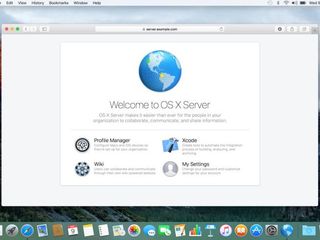OS X Server 5.0 released with El Capitan support; Yosemite users can upgrade for free

Apple has launched OS X Server 5.0 in the Mac App Store for $19.99. The new version supports the upcoming release of OS X 10.11, also known as El Capitan. However, users of the current OS X 10.10.5 Yosemite can upgrade to OS X Server 5.0 for free.
In the past, the yearly upgrades to OS X Server have always cost $19.99, so allowing Yosemite users to get the new version for free is a change in Apple's business model. Here's the change log for OS X Server 5.0:
- OS X Server 5.0 features a cleaner, more consistent user interface.
- OS X Server 5.0 is now operating system version independent. The same version of Server can be used on Mac computers running OS X Yosemite 10.10.5 and OS X El Capitan 10.11.
- OS X Server can perform network diagnostic tests to verify that your server is accessible from the Internet. New diagnostic tests include the ability to verify when specific websites are no longer reachable and when DNS MX records are incorrectly configured or missing.
Caching Server
- Caching Server can accelerate the download of iCloud data, including documents in iCloud Drive and photos. Enabling iCloud Acceleration reduces the amount of iCloud data that must be downloaded when users have multiple devices on the same network.
File Sharing
- iOS 9 users can easily access and store documents on OS X Server. Once a share point is created, it can be shared to iOS devices and made available using traditional file sharing protocols such as SMB and AFP. This allows users to open, edit and save documents from both iOS 9 and OS X 10.11.
Profile Manager
- Profile Manager supports new MDM commands and queries as well as Configuration Profile payloads and settings introduced in iOS 9 and OS X 10.11.
iOS and OS X
- Device-based Volume Purchase Program (VPP) app assignment: Assign VPP apps to devices instead of a user's Apple ID. This allows for the installation of VPP apps on iOS devices and Mac computers without configuring an Apple ID or sending an invitation.
- VPP Managed Distribution migration: Migrate apps already installed on a device from assignment to a user's Apple ID to assignment to that device without deleting the app or user data.
- App installation improvements: App Store apps can be installed even if the App Store is disabled. This includes newly assigned apps and app updates.
iOS 9
Master your iPhone in minutes
iMore offers spot-on advice and guidance from our team of experts, with decades of Apple device experience to lean on. Learn more with iMore!
- Single Sign-On: Apps configured to use Kerberos will automatically launch per-app VPN when a user logs in to that app.
- Skip steps in Setup Assistant: Devices enrolled in the Device Enrollment Program (DEP) can be configured to remove the new Move from Android option from the Setup pane in Setup Assistant.
- Update to latest iOS: Update DEP-enrolled supervised devices to the latest iOS.
- Network usage rules: Network usage rules allow organizations to specify how managed apps use networks, such as cellular data networks; for example, restricting the app's ability to connect over cellular or when roaming on other networks. These rules apply only to managed apps.
- New device restrictions: Prevent Mail Drop; prevent trusting new enterprise app authors; prevent the use of AirDrop when the app is managed.
- New restrictions for supervised devices: Prevent changing the wallpaper; prevent changing the device name; prevent enabling iCloud Photo Library; prevent keyboard shortcuts; prevent pairing with Apple Watch; prevent setting a passcode.
- OS X Server accounts can be added in the Mail, Contacts and Calendars section of the Settings application in iOS 9.
OS X El Capitan
- Create a standard account or skip account setup during DEP enrollment: Configure OS X Setup Assistant to create a new standard (non-admin) account or skip account creation entirely during DEP enrollment.
- Hidden administrator account: Automatically create an administrator account during initial system setup. The presence of this account can be hidden from standard users.
- New MDM commands: Install Software Update on DEP-enrolled Mac Computers; Get Active Managed Users.
- New restrictions: Prevent the use of iCloud documents and data; prevent Spotlight suggestions; prevent use of iSight camera; prevent sending diagnostic data to Apple; prevent dictionary lookup.
- $19.99 - Download now
I have been writing professionally about technology and gaming news for 14 years.
Most Popular






